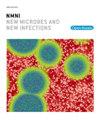Risk of tuberculosis disease in patients receiving TNF-α antagonist therapy: A meta-analysis of randomized controlled trials
IF 2.9
Q2 INFECTIOUS DISEASES
引用次数: 0
Abstract
Introduction
Tuberculosis (TB) risk associated with tumor necrosis factor-alpha (TNF-α) antagonist therapy in patients with autoimmune diseases is a significant concern. This study aims to evaluate the risk of TB disease associated with TNF-α antagonist therapy.
Methods
An extensive search of PubMed/MEDLINE, EMBASE, and the Cochrane CENTRAL databases was conducted to identify randomized controlled trials (RCTs) assessing TB disease risk in patients receiving TNF-α antagonist therapy available until November 1, 2024. The pooled statistic used was the weighted odds ratio (OR) and a corresponding 95 % confidence interval (CI). Statistical analysis was performed using Comprehensive Meta-Analysis software, version 3.0 (Biostat Inc., Englewood, NJ, USA).
Results
Fifty-six RCTs, totaling 22,212 adult patients, met the specified eligibility criteria. Pooled analysis revealed an increased risk of TB disease associated with TNF-α antagonist therapy (OR 1.52, 95 % CI 1.03–2.26, p = 0.03). Subgroup analyses indicated a higher risk in patients with rheumatoid arthritis (RA) (OR 2.25, 95 % CI 1.13–4.45, p = 0.02), while no significant associations were found in patients with ankylosing spondylitis (AS) or psoriasis (Ps). Analyses by specific TNF-α antagonist drugs did not yield significant associations with risk of TB disease.
Conclusion
Our study highlights an increased risk of TB disease associated with TNF-α antagonist therapy, particularly in patients with RA. However, the absence of significant associations in AS or Ps patients suggests disease-specific variations in risk of TB disease. Further research is needed to elucidate the long-term safety profile of TNF-α antagonist drugs and their associations with risk of TB disease in different patient populations.
接受 TNF-α 拮抗剂治疗的患者罹患结核病的风险:随机对照试验荟萃分析
引言自身免疫性疾病患者接受肿瘤坏死因子-α(TNF-α)拮抗剂治疗后患结核病(TB)的风险令人担忧。本研究旨在评估与TNF-α拮抗剂治疗相关的结核病风险。方法对PubMed/MEDLINE、EMBASE和Cochrane CENTRAL数据库进行了广泛检索,以确定2024年11月1日之前可获得的、评估接受TNF-α拮抗剂治疗患者结核病风险的随机对照试验(RCT)。使用的汇总统计量是加权几率比(OR)和相应的 95 % 置信区间(CI)。统计分析采用 Comprehensive Meta-Analysis 软件 3.0 版(Biostat Inc.汇总分析显示,TNF-α拮抗剂治疗增加了结核病的患病风险(OR 1.52,95 % CI 1.03-2.26,p = 0.03)。亚组分析表明,类风湿性关节炎(RA)患者的风险较高(OR 2.25,95 % CI 1.13-4.45,p = 0.02),而强直性脊柱炎(AS)或银屑病(Ps)患者的风险则不明显。结论我们的研究强调了TNF-α拮抗剂治疗会增加结核病的患病风险,尤其是在RA患者中。然而,AS或Ps患者中没有明显的相关性,这表明结核病的风险存在疾病特异性差异。需要进一步开展研究,以阐明TNF-α拮抗剂药物的长期安全性及其与不同患者群体结核病风险的关系。
本文章由计算机程序翻译,如有差异,请以英文原文为准。
求助全文
约1分钟内获得全文
求助全文
来源期刊

New Microbes and New Infections
Medicine-Infectious Diseases
CiteScore
10.00
自引率
2.50%
发文量
91
审稿时长
114 days
 求助内容:
求助内容: 应助结果提醒方式:
应助结果提醒方式:


